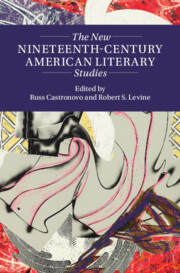Book contents
- The New Nineteenth-Century American Literary Studies
- Twenty-First-Century Critical Revisions
- The New Nineteenth-Century American Literary Studies
- Copyright page
- Contents
- Notes on Contributors
- Acknowledgments
- Introduction
- Chapter 1 Harriet Wilson’s Lessons
- Chapter 2 Frances Ellen Watkins Harper and the New Civil War Literary Studies
- Chapter 3 The Global South
- Chapter 4 Making It New
- Chapter 5 Law, Nineteenth-Century American Literary Studies, and the Black Formalist Tradition
- Chapter 6 Conjuring Nineteenth-Century Black Environmentalism
- Chapter 7 Transitioning Queer Studies in Nineteenth-Century American Literature
- Chapter 8 New Materialisms and Scalar Collapse in Nineteenth-Century American Literary Studies
- Chapter 9 Nineteenth-Century Spanish-Language Textbooks and US American Literature
- Chapter 10 The Political Functions of Reconstruction Literature, Then and Now
- Chapter 11 Echoes from the Past, Archives of the Future
- Chapter 12 Beyond the Secularization Thesis
- Chapter 13 A Periodical Masquerade
- Chapter 14 Tasteful Sketches and Tasteless Ambition
- Chapter 15 Grounding Nineteenth-Century Studies in Indigenous Studies
- Chapter 16 Cultures of Data
- Chapter 17 Rethinking Critical Geographies
- Chapter 18 Rethinking Black Speculative Fiction
- Chapter 19 The Black Pacific
- Chapter 20 “Unfeeling Stone”
- Index
Chapter 10 - The Political Functions of Reconstruction Literature, Then and Now
Published online by Cambridge University Press: 02 January 2025
- The New Nineteenth-Century American Literary Studies
- Twenty-First-Century Critical Revisions
- The New Nineteenth-Century American Literary Studies
- Copyright page
- Contents
- Notes on Contributors
- Acknowledgments
- Introduction
- Chapter 1 Harriet Wilson’s Lessons
- Chapter 2 Frances Ellen Watkins Harper and the New Civil War Literary Studies
- Chapter 3 The Global South
- Chapter 4 Making It New
- Chapter 5 Law, Nineteenth-Century American Literary Studies, and the Black Formalist Tradition
- Chapter 6 Conjuring Nineteenth-Century Black Environmentalism
- Chapter 7 Transitioning Queer Studies in Nineteenth-Century American Literature
- Chapter 8 New Materialisms and Scalar Collapse in Nineteenth-Century American Literary Studies
- Chapter 9 Nineteenth-Century Spanish-Language Textbooks and US American Literature
- Chapter 10 The Political Functions of Reconstruction Literature, Then and Now
- Chapter 11 Echoes from the Past, Archives of the Future
- Chapter 12 Beyond the Secularization Thesis
- Chapter 13 A Periodical Masquerade
- Chapter 14 Tasteful Sketches and Tasteless Ambition
- Chapter 15 Grounding Nineteenth-Century Studies in Indigenous Studies
- Chapter 16 Cultures of Data
- Chapter 17 Rethinking Critical Geographies
- Chapter 18 Rethinking Black Speculative Fiction
- Chapter 19 The Black Pacific
- Chapter 20 “Unfeeling Stone”
- Index
Summary
This chapter examines the emergence of Reconstruction literature as a field of study within nineteenth-century American literature. What can we learn from the appearance of Reconstruction literature as an area of research now, given the troubled landscape of our own twenty-first century? I suggest an answer by focusing on the public political function that this body of writing represented: Reconstruction literature constituted the playing field for fierce debates surrounding Black citizenship and enfranchisement, federal government oversight, and Confederate punishment. Case in point is Albion W. Tourgée’s novel A Fool’s Errand (1879), which, when it appeared in 1879, was hailed as the “Uncle Tom’s Cabin of Reconstruction.” Deploying Tourgée as a representative Reconstruction writer, I ask what his novel’s varied reception by diverse Americans can teach us about the significance that fictional works held for postbellum policy debates, and what this state of affairs illuminates about the place of Reconstruction literature in the twenty-first century, particularly given the disappearance of nineteenth-century American literature as a dedicated hiring field in the academy today. Ultimately, I argue that to realize the promise of Reconstruction literature requires time and resources, and a reinvigoration of the role of the university in democratic society.
Keywords
- Type
- Chapter
- Information
- The New Nineteenth-Century American Literary Studies , pp. 144 - 157Publisher: Cambridge University PressPrint publication year: 2025

